[wpcol_1half id=”” class=”” style=””]
 Shifting to the Parliamentary System is perhaps the most technical and most complicated of all the three agenda points in the Three Point CoRRECT™ Agenda. It is for this reason that we needed to compile as many information resources & links on the topic in order to give Filipinos a better appreciation of what the Parliamentary System is all about and how it actually works.
Shifting to the Parliamentary System is perhaps the most technical and most complicated of all the three agenda points in the Three Point CoRRECT™ Agenda. It is for this reason that we needed to compile as many information resources & links on the topic in order to give Filipinos a better appreciation of what the Parliamentary System is all about and how it actually works.
Let’s be honest. Economic Liberalization is rather obvious to anyone who is untainted by pseudo-Nationalist pro-Oligarch or pro-Communist leftist propaganda: Less Protectionism = More investors = More Jobs = Good for everyone. No issues there among logical and rational people who do their best to stay away from misguided ideological biases. Economic Liberalization’s obvious benefits are rather straightforward and easy to understand. More Jobs, More Prosperity.
Evolving Federalism‘s benefits are also rather obvious: Just wander around Manila and see how over-congested and over-crowded it is, all because most economic opportunities are found exclusively in the capital, leaving the regions and provinces relatively neglected. Region-based decentralization (aka “Evolving Federalism”) thus ensures that empowering the regions economically and politically can give them the initiative and the power to pursue their own economic and cultural development. Why limit development only to the Capital when we have an entire country with 7,107 islands many of which are ripe for development? Evolving Federalism is thus an easy-to-understand proposition. Spread development.
But what about Shifting to the Parliamentary System? Alas, the US-centric media, news information, and Hollywood-based entertainment that Filipinos are largely exposed to inundates Filipinos with the words “President” and “Presidential“, so much so that we are just unable to shake off our fixation on the current Presidential System that is inspired – in form, though not in substance – by the American system. Understanding how shifting to the Parliamentary System will provide solid benefits to the Philippines most definitely requires that Filipinos first gain a good enough understanding of how a Parliamentary System truly works.

Filipinos are too enamored by Hollywood’s portrayal of the US President that we can’t imagine letting go of our US-derived Presidential System – (The West Wing; Dave; The American President; Sum of All Fears)
A large number of Filipinos have almost zero understanding of it unfortunately, and this is because we have no real exposure to it, unless such Filipinos live or work abroad as OFW’s in countries that actively use Parliamentary Systems. Most Filipinos don’t understand how a Prime Minister emerges, and the most common mistake Filipinos make is in thinking that Prime Ministers are “voted by the members of the Legislature to become Prime Ministers.” Wrong.
That is how Speakers of the House in the USA and Philippines – both Presidential Systems – are chosen. That is also how Speakers of Parliament in Parliamentary Systems are chosen. Speakers can be anyone: and they are chosen by their peers to become Speakers and Speakers are not the same as Prime Ministers. In the US & Philippine System, Speakers of the House “preside” over debates as moderators, yet they may be partisan and take sides on policies or issues. Majority Floor Leaders play the debating “lead role” that Prime Ministers in Parliamentary Systems play.
But in Parliamentary Systems, Speakers are strictly non-partisan and facilitate debates between two sides, and cannot take sides. For the longest time, Speakers of Parliament also wore distinctive attire: Wigs and Robes, resembling judges. Prime Ministers, on the other hand, lead the Majority side (aka “the Government”) in debates against the Minority side, which is in turn led by the Leader of the Opposition.
Prime Ministers actively engage in debate. Speakers do not.
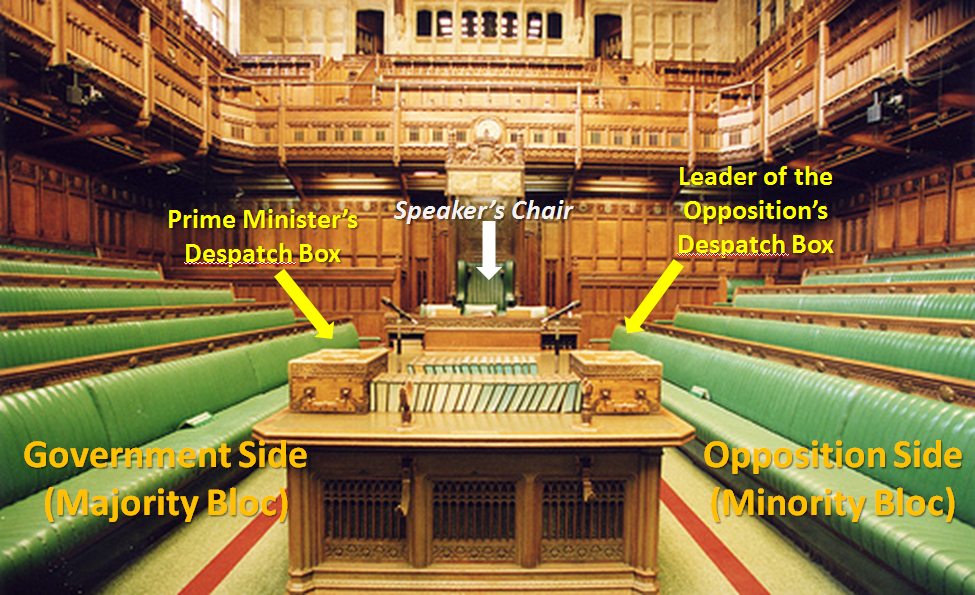
The Speaker is the “Debate Moderator” who presides over and facilitates debates. The Prime Minister is the lead debater of the Majority team (“the Government”) against the Minority team (“the Opposition”)
Most Filipinos do not realize that Prime Ministers in Parliamentary Systems must always necessarily be the most senior leader (aka “the Party Leader) of the party that gets the Majority of all parliamentary seats (50% + 1 of all seats), or is the most senior leader of the party that has the most number of seats within a coalition that was formed with several other parties to form the majority bloc. Facts like these are often unknown to most Filipinos and this causes many to be unable to appreciate the logical and algorithmic superiority of the Parliamentary System versus the Presidential System, as they tend to think that what is currently practiced in the current Presidential System pertaining to the selection of the Speaker of the House will also apply in the selection of the Prime Minister. Unfortunately, that assumption is incorrect.
It is imperative that Filipinos be educated and informed to at least understand how Parliamentary Systems basically work and avoid wrongly assuming that the way the current House of Representatives in the Philippines works is also how a future Philippine Parliament will work.
To gain a good basic understanding of how parliamentary systems work, please familiarize yourselves first with the British Westminster System by visiting the UK’s Parliamentary Website (http://www.parliament.uk/) or by learning a bit about the Spanish Parliament.
Numerous links below have been compiled in order to give all Filipinos a better appreciation of how a Parliamentary System works and, more importantly, why Parliamentary Systems are Superior to Presidential Systems.
[/wpcol_1half]
[wpcol_1half_end id=”” class=”” style=””]
Feel free to click on each of the links below so that you can watch youtube videos that can instruct you about the Parliamentary System or how it works…
Youtube Video Links:
1) Presidential versus Parliamentary
5) Canadian Politics for Dummies
6) Hung Parliament in 3 Minutes
7) A Guide to the UK Elections—for Americans
8) Explanation of Bahamas Parliament
9) UK’s Parliamentary Education Service
10) Fareed Zakaria: Parliamentary is superior to Presidential
11) Why is the Philippines a Failed State?
Interview on GNN’s Business Portal Trends & Analysis “The Mid-East Crisis & Constitutional Reform” – focusing on the Parliamentary System:* * *
Interview on GNN’s Business Portal Trends & Analysis “The Mid-East Crisis & Constitutional Reform” – focusing on the Parliamentary System:
The articles below are extremely helpful to understanding the advantages that using a Parliamentary System has over using a Presidential System. It also helps that these articles talk about inputs of people from a variety of countries so that a much more comprehensive series of perspectives can be viewed.
Articles other people wrote:
1. Parliament Works Better by Craig Ruff
2. Failure of the Presidential System by Mike (Netwars Blog)
3. Some Appealing Features of a Parliamentary System by Eric Black
4. Dismissing Gridlock: A Case for Parliamentary Systems by Dr. Lee Drutman
5. Parliamentary Government trumps Presidential by Ramesh Thakur
6. Why are Presidents Less Effective than Prime Ministers? by John Pavlus, based on the research of Daniel Deiermeier, Pohan Fong, & Razvan Vlaicu
7. Does America Need a Prime Minister? by Dr. Fareed Zakaria
8. Spain’s Electoral System – Historical Accident
9. Ivory Coast Can Learn from the Parliamentry System of Governance by Mamadou Koulibaly
10. Fika urges return to the Parliamentary System by Edwin Olofu
11. The National Question: Towards A New Constitutional Order by Anthony Enahoro
12. A Vote for Parliamentary Democracy by Cosmas Odoemena
13. Is Parliamentary the Best Option For Nigeria? by Davidson Iriekpen
14. Ajibola Advocates A Return to the Parliamentary System by Ifedayo Adebay
15. Parliamentary System is Best by Ibiyinka Solarin
16. Abdullah Abdullah of Afghanistan: Pro-Parliamentary
17. Might a Parliamentary System Better Serve Mexico? By Patrick Corcoran
18. Zakaria, Parliamentarism Vs. Presidentialism & Budget by Don Rich
19. Egypt Doesn’t Need Another Pharaoh by Alfred Stepan
20. Egypt’s Power Shift: from President to Parliament – through Proportional Representation by Ellen Lust
21. The Problem of a Presidential-Multiparty System by Hanta Yuda A.R.
PDF Files & Academic Studies:
- Perils of Presidentialism by Juan Linz, PhD
- Democracy: Presidential or Parliamentary – Does it Make a Difference? by Juan Linz, PhD
- The Advantages of Parliament beyond the Perils of Presidentialism: Parliament’s Prospects for Indirect Deliberative Democracy by François de Soete
- Should the Philippines Turn Parliamentary? by Butch Abad
- Corruption is Less in Parliamentary than Presidential Systems by Drs. Lederman, Loayza, and Soares
- Are Parliamentary Systems Better? by Drs. Gerring, Thacker, & Moreno
- IPER’s Whitepaper on the Parliamentary System by Earl Parreño
- Comparing Parliamentary versus Presidential Systems’ Corruption levels by Drs. Gerring & Thacker
- Democratic Deficits in the Philippines: What is to be done? by Dr. Clarita Carlos & Mr. Dennis Lalata (This is a book, start on page 16)
- Recruiting from Parliament and Beyond: The Selection of Ministers in Multilevel Spain by Juan Rodríguez Teruel
- Germany: The Original Mixed Member Proportional System by Michael Krennerich
- The Common Law and Economic Growth: Hayek Might be Right by Paul G. Mahone
- Democracy with An Adjective: Liberal Democracy in A Muslim Society by Dr. Bican Shahin
- Constitutional Choices for New Democracies by Arend Lijphart
- Latin American Presidencies Interrupted by Arturo Valenzuela
- Can Presidentialism Work Like Parliamentarism? by Josep M. Colomer and Gabriel L. Negretto
- Presidentialism, Multipartism, and Democracy The Difficult Combination by Scott Mainwaring
- Government Coalitions and Legislative Success Under Presidentialism and Parliamentarism by José Antonio Cheibub, Adam Przeworski, and Sebastian Saiegh
- Constitutional Frameworks and Democratic Consolidation: Parliamentarianism versus Presidentialism by Wolfgang Müller, Torbjörn Bergman & Kaare Strøm
[/wpcol_1half_end]
* * *
* * *
Articles to read:
- Philippine Progress: Shift in Sports, Shift in System — http://correctphilippines.org/philippineprogress
- Senator Pangilinan & the Parliamentary System — http://correctphilippines.org/spps
- The Parliamentary System fits the Philippines — http://correctphilippines.org/parliament_fits_the_philippines
- Two Filipinos: A Football Legend and a Spanish Prime Minister —http://correctphilippines.org/2_filipinos
* * *
Useful Country Rankings:
[wpcol_1third id=”” class=”” style=””]

Parliamentary Systems outperform Presidential Systems in the Heritage Foundation’s and Wall Street Journal’s Economic Freedom Index – 2008
* * *
[/wpcol_1third]
[wpcol_1third id=”” class=”” style=””]
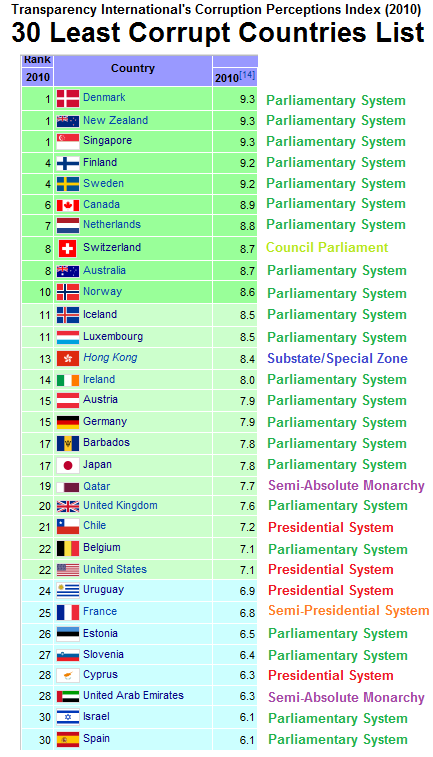
Parliamentary Systems outperform Presidential Systems in terms of being corruption-free, according to Transparency International’s Corruption Perceptions Index of 2010
* * *
[/wpcol_1third]
[wpcol_1third_end id=”” class=”” style=””]
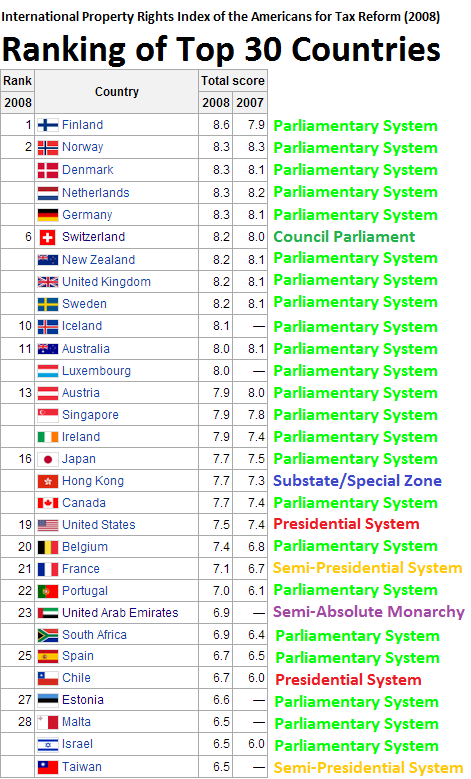
Countries using Parliamentary Systems are better at protecting Property Rights than countries using Presidential Systems. (USA is only at number 19)
* * *
[/wpcol_1third_end]
[wpcol_1half id=”” class=”” style=””]

Countries using Parliamentary Systems dominate the top 30 rankings of countries in the Ease of Doing Business Index.
* * *
[/wpcol_1half]
[wpcol_1half_end id=”” class=”” style=””]
* * *
[/wpcol_1half_end]
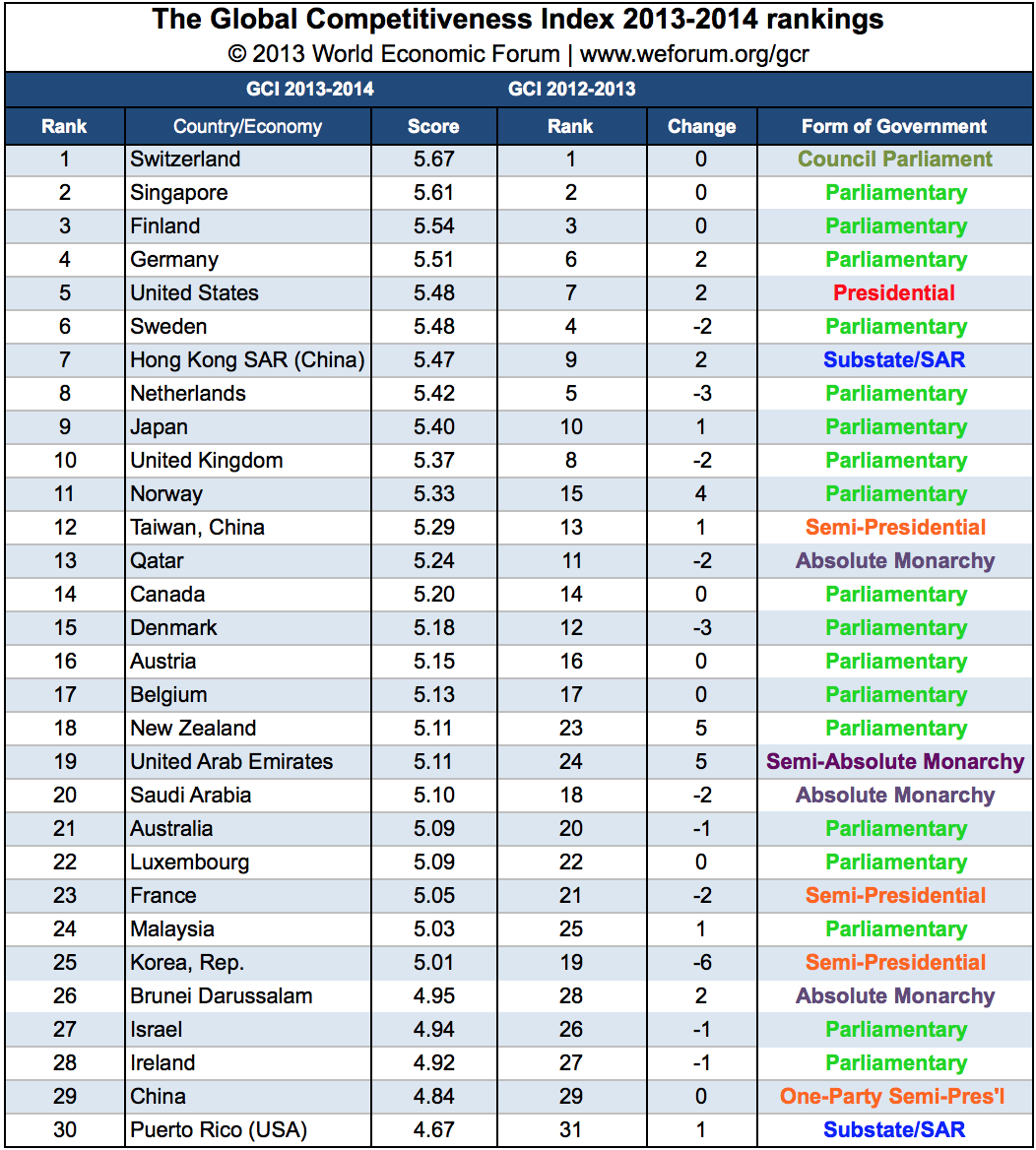
[wpcol_1half id=”” class=”” style=””]
* * *
[/wpcol_1half]
[wpcol_1half_end id=”” class=”” style=””]

The list of Worst 30 countries according to GDP per Capita is dominated by countries using Presidential Systems
[/wpcol_1half_end]
Useful Diagrams on the Parliamentary System
[wpcol_1half id=”” class=”” style=””]
[/wpcol_1half]
[wpcol_1half_end id=”” class=”” style=””]
[/wpcol_1half_end][fikraticker spec_query=’category_name=Parliamentary System’]
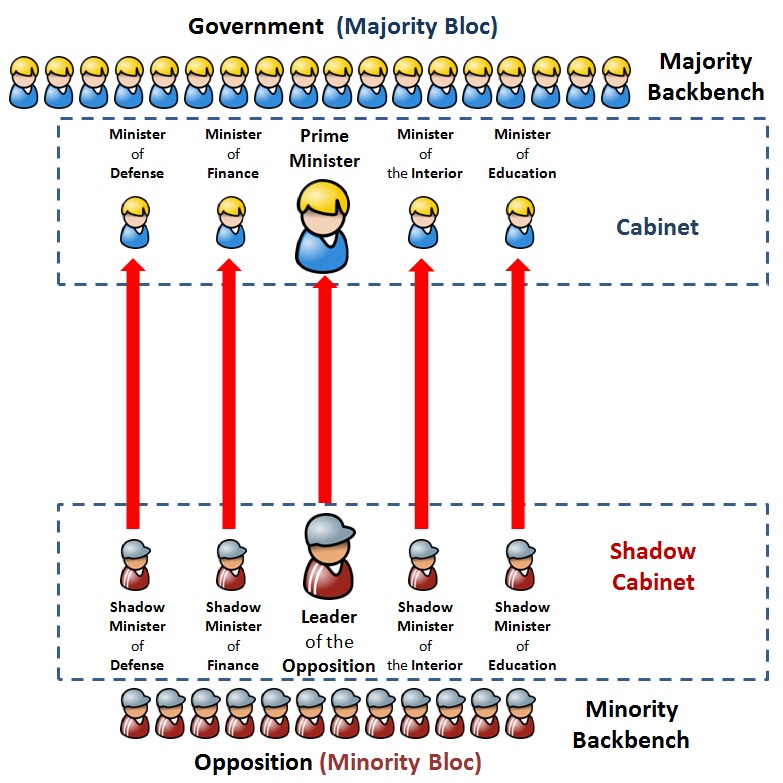
Parliamentary Systems feature Shadow Cabinets who are always monitoring and scrutinizing the Government Cabinet. Another reason why Parliamentary Systems are less prone to Corruption than Presidential Systems.
[organizing spec_query=’category_name=Parliamentary System’]


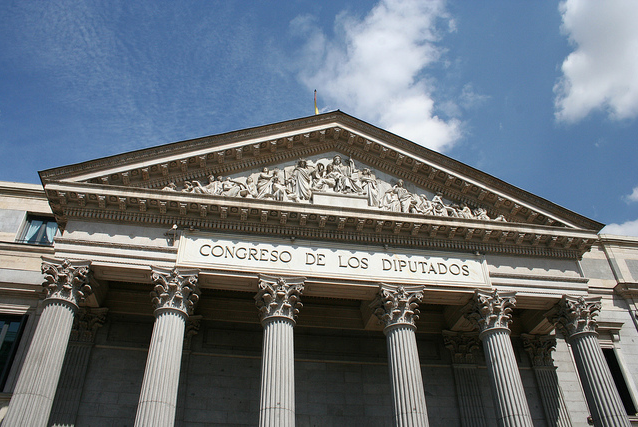
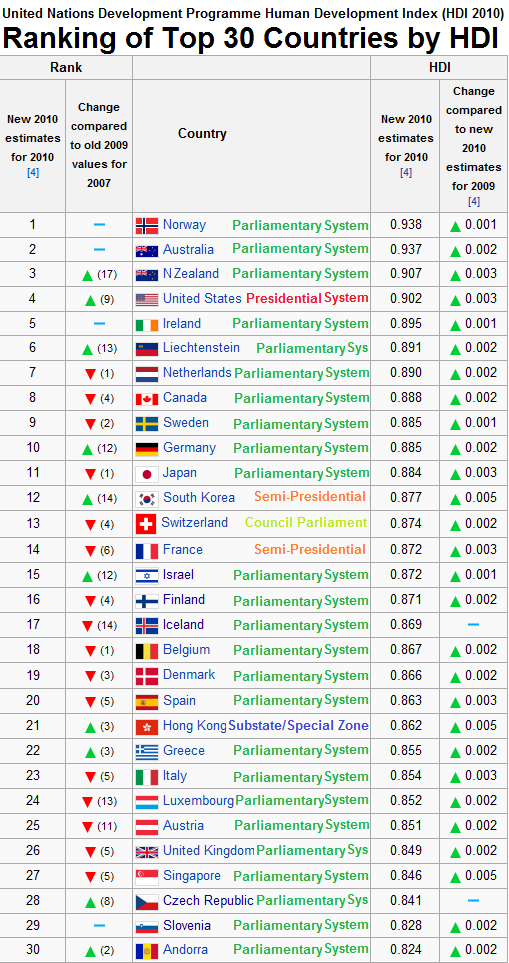
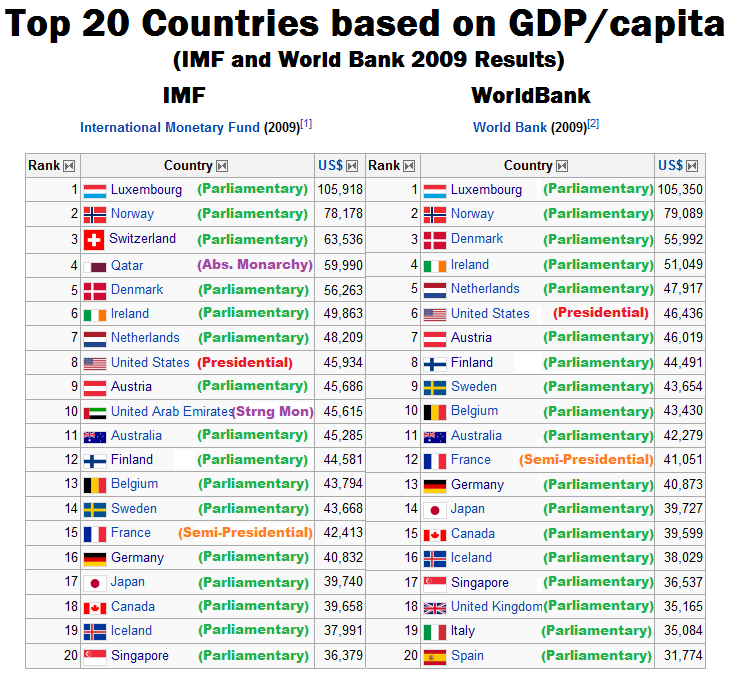
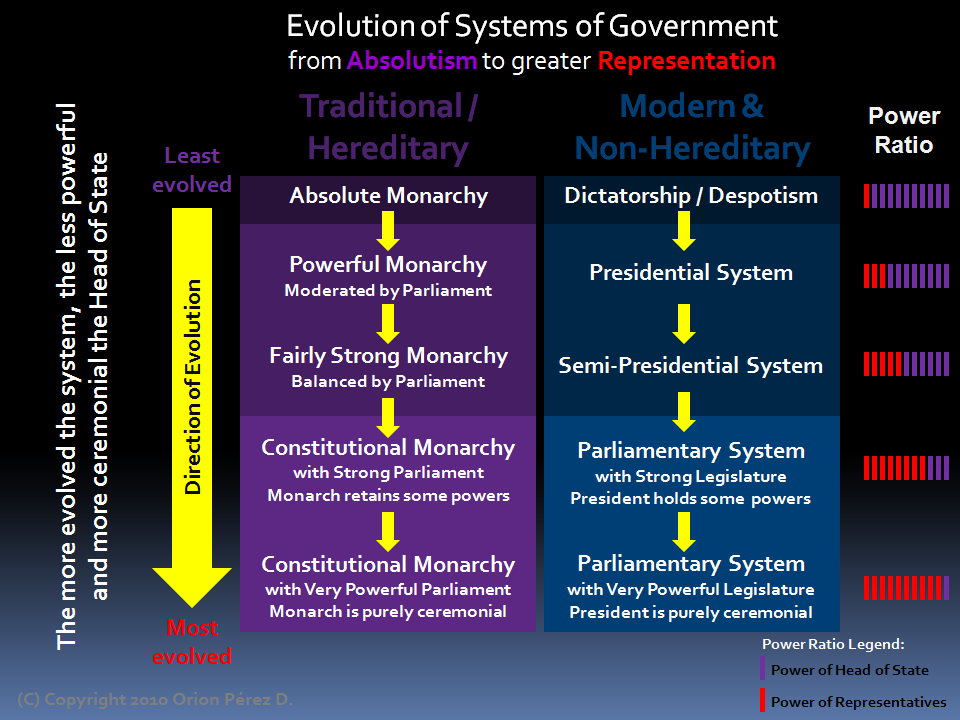
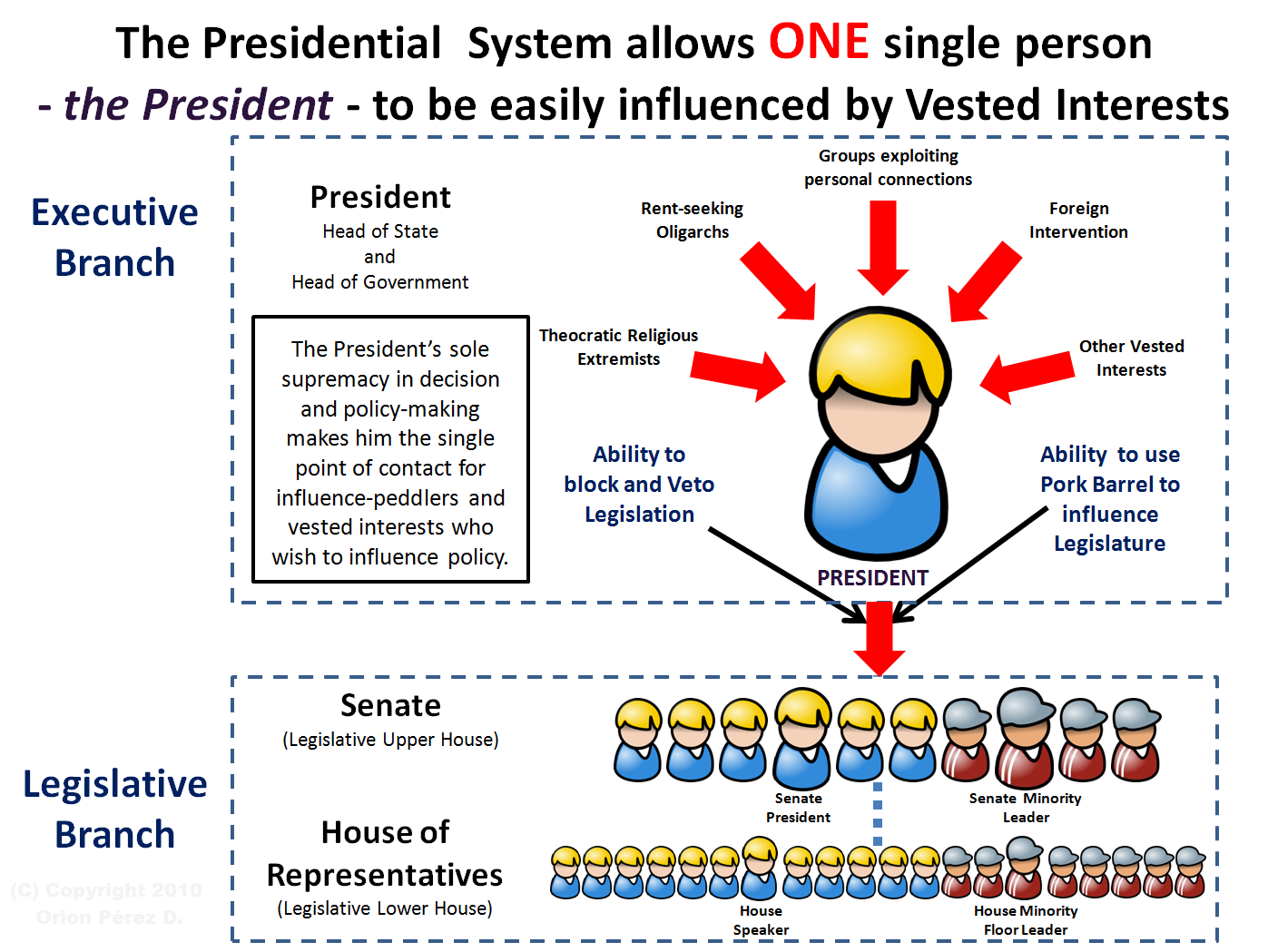
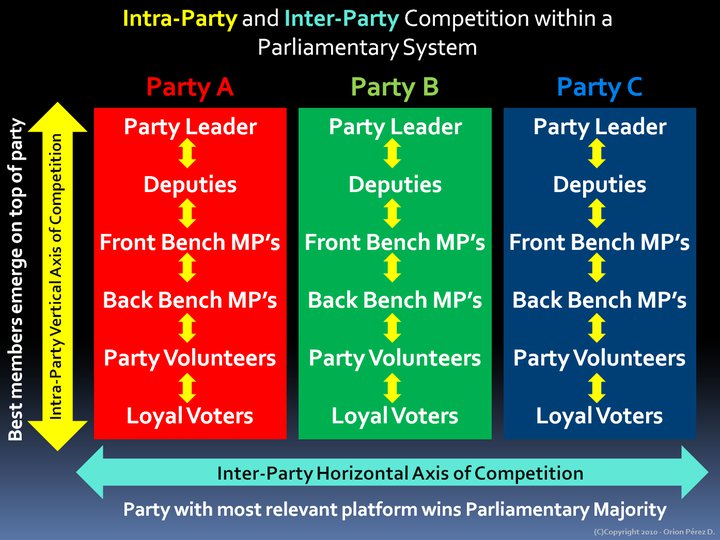
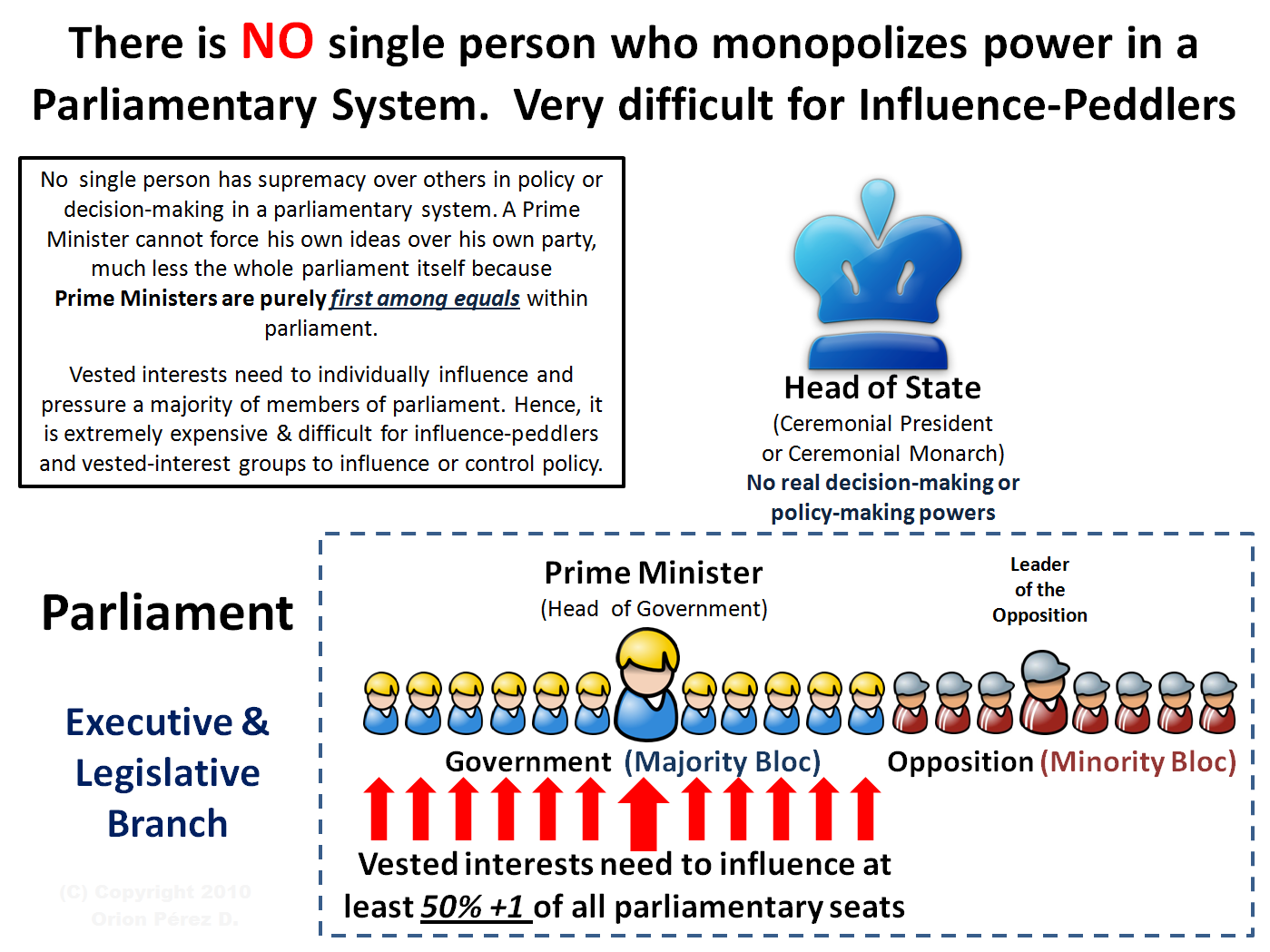
 I believe: This is a CoRRECT™ Video with a very positive message
I believe: This is a CoRRECT™ Video with a very positive message Walang Natira: Gloc-9's MTV Rap about the OFW Phenomenon
Walang Natira: Gloc-9's MTV Rap about the OFW Phenomenon